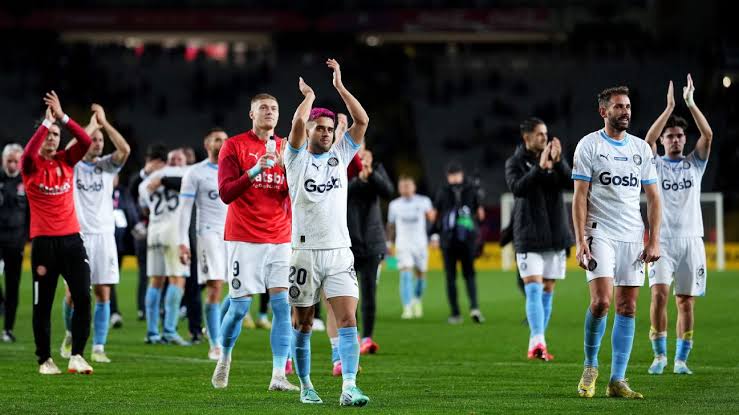Girona FC, at the weekend, secured a coveted spot in the illustrious Champions League for the first time in their history, after a stunning 4-2 victory over FC Barcelona.
This remarkable achievement follows just their fourth season in La Liga’s top flight.
However, amidst the celebrations, grave concerns arise regarding the club’s ownership structure, raising doubts about their eligibility to compete in European football’s premier tournament.
At the crux of the issue lies the intricate ownership network involving City Football Group, a subsidiary of the Abu Dhabi United Group.
Notably, City Football Group commands a significant 47% stake in Girona FC, alongside its complete ownership of Manchester City Football Club, recent winners of both the Champions League and the English Premier League.
Pere Guardiola, sibling to Manchester City’s manager Pep Guardiola, holds a 16% stake in Girona FC, while Marcelo Claure, a prominent business figure, boasts a substantial 35% share.
Adding complexity, UEFA’s rigorous regulations for the 2024/25 Champions League season expressly prohibit any entity from exerting control or influence over more than one participating club.
Under intense scrutiny are three pivotal figures within Girona FC’s Board of Administrators: John MacBeath, Simon Cliff, and Ingo Bank.
MacBeath serves as a Board Member at Manchester City, Cliff holds the role of General Counsel to City Football Group, and Bank reportedly maintains affiliations with the conglomerate.
With UEFA’s deadline looming on June 3, 2024, Girona FC faces a race against time to implement necessary structural changes to adhere to the regulations or face exclusion from the Champions League.
The club must promptly identify replacements for board members linked with City Football Group and demonstrate operational autonomy from its English counterpart.
Given Manchester City’s prominence and Girona’s sudden rise on the European scene, UEFA stands poised to closely monitor the relationship between both entities, prepared to launch investigations if warranted.
Drawing parallels from previous UEFA rulings, such as the precedent set by Red Bull Salzburg and RB Leipzig in the 2017/18 season, offers insight into the potential resolution. Both clubs were granted participation after satisfying UEFA that no single entity wielded decisive influence over both teams.
While restructuring within Girona’s hierarchy is inevitable, there remains optimism that requisite adjustments will be made in time for their Champions League debut next season. Girona FC, at the weekend, secured a coveted spot in the illustrious Champions League for the first time in their history, after a stunning 4-2 victory over FC Barcelona.
This remarkable achievement follows just their fourth season in La Liga’s top flight.
However, amidst the celebrations, grave concerns arise regarding the club’s ownership structure, raising doubts about their eligibility to compete in European football’s premier tournament.
At the crux of the issue lies the intricate ownership network involving City Football Group, a subsidiary of the Abu Dhabi United Group.
Notably, City Football Group commands a significant 47% stake in Girona FC, alongside its complete ownership of Manchester City Football Club, recent winners of both the Champions League and the English Premier League.
Pere Guardiola, sibling to Manchester City’s manager Pep Guardiola, holds a 16% stake in Girona FC, while Marcelo Claure, a prominent business figure, boasts a substantial 35% share.
Adding complexity, UEFA’s rigorous regulations for the 2024/25 Champions League season expressly prohibit any entity from exerting control or influence over more than one participating club.
Under intense scrutiny are three pivotal figures within Girona FC’s Board of Administrators: John MacBeath, Simon Cliff, and Ingo Bank.
MacBeath serves as a Board Member at Manchester City, Cliff holds the role of General Counsel to City Football Group, and Bank reportedly maintains affiliations with the conglomerate.
With UEFA’s deadline looming on June 3, 2024, Girona FC faces a race against time to implement necessary structural changes to adhere to the regulations or face exclusion from the Champions League.
The club must promptly identify replacements for board members linked with City Football Group and demonstrate operational autonomy from its English counterpart.
Given Manchester City’s prominence and Girona’s sudden rise on the European scene, UEFA stands poised to closely monitor the relationship between both entities, prepared to launch investigations if warranted.
Drawing parallels from previous UEFA rulings, such as the precedent set by Red Bull Salzburg and RB Leipzig in the 2017/18 season, offers insight into the potential resolution. Both clubs were granted participation after satisfying UEFA that no single entity wielded decisive influence over both teams.
While restructuring within Girona’s hierarchy is inevitable, there remains optimism that requisite adjustments will be made in time for their Champions League debut next season.
This remarkable achievement follows just their fourth season in La Liga’s top flight.
However, amidst the celebrations, grave concerns arise regarding the club’s ownership structure, raising doubts about their eligibility to compete in European football’s premier tournament.
At the crux of the issue lies the intricate ownership network involving City Football Group, a subsidiary of the Abu Dhabi United Group.
Notably, City Football Group commands a significant 47% stake in Girona FC, alongside its complete ownership of Manchester City Football Club, recent winners of both the Champions League and the English Premier League.
Pere Guardiola, sibling to Manchester City’s manager Pep Guardiola, holds a 16% stake in Girona FC, while Marcelo Claure, a prominent business figure, boasts a substantial 35% share.
Adding complexity, UEFA’s rigorous regulations for the 2024/25 Champions League season expressly prohibit any entity from exerting control or influence over more than one participating club.
Under intense scrutiny are three pivotal figures within Girona FC’s Board of Administrators: John MacBeath, Simon Cliff, and Ingo Bank.
MacBeath serves as a Board Member at Manchester City, Cliff holds the role of General Counsel to City Football Group, and Bank reportedly maintains affiliations with the conglomerate.
With UEFA’s deadline looming on June 3, 2024, Girona FC faces a race against time to implement necessary structural changes to adhere to the regulations or face exclusion from the Champions League.
The club must promptly identify replacements for board members linked with City Football Group and demonstrate operational autonomy from its English counterpart.
Given Manchester City’s prominence and Girona’s sudden rise on the European scene, UEFA stands poised to closely monitor the relationship between both entities, prepared to launch investigations if warranted.
Drawing parallels from previous UEFA rulings, such as the precedent set by Red Bull Salzburg and RB Leipzig in the 2017/18 season, offers insight into the potential resolution. Both clubs were granted participation after satisfying UEFA that no single entity wielded decisive influence over both teams.
While restructuring within Girona’s hierarchy is inevitable, there remains optimism that requisite adjustments will be made in time for their Champions League debut next season. Girona FC, at the weekend, secured a coveted spot in the illustrious Champions League for the first time in their history, after a stunning 4-2 victory over FC Barcelona.
This remarkable achievement follows just their fourth season in La Liga’s top flight.
However, amidst the celebrations, grave concerns arise regarding the club’s ownership structure, raising doubts about their eligibility to compete in European football’s premier tournament.
At the crux of the issue lies the intricate ownership network involving City Football Group, a subsidiary of the Abu Dhabi United Group.
Notably, City Football Group commands a significant 47% stake in Girona FC, alongside its complete ownership of Manchester City Football Club, recent winners of both the Champions League and the English Premier League.
Pere Guardiola, sibling to Manchester City’s manager Pep Guardiola, holds a 16% stake in Girona FC, while Marcelo Claure, a prominent business figure, boasts a substantial 35% share.
Adding complexity, UEFA’s rigorous regulations for the 2024/25 Champions League season expressly prohibit any entity from exerting control or influence over more than one participating club.
Under intense scrutiny are three pivotal figures within Girona FC’s Board of Administrators: John MacBeath, Simon Cliff, and Ingo Bank.
MacBeath serves as a Board Member at Manchester City, Cliff holds the role of General Counsel to City Football Group, and Bank reportedly maintains affiliations with the conglomerate.
With UEFA’s deadline looming on June 3, 2024, Girona FC faces a race against time to implement necessary structural changes to adhere to the regulations or face exclusion from the Champions League.
The club must promptly identify replacements for board members linked with City Football Group and demonstrate operational autonomy from its English counterpart.
Given Manchester City’s prominence and Girona’s sudden rise on the European scene, UEFA stands poised to closely monitor the relationship between both entities, prepared to launch investigations if warranted.
Drawing parallels from previous UEFA rulings, such as the precedent set by Red Bull Salzburg and RB Leipzig in the 2017/18 season, offers insight into the potential resolution. Both clubs were granted participation after satisfying UEFA that no single entity wielded decisive influence over both teams.
While restructuring within Girona’s hierarchy is inevitable, there remains optimism that requisite adjustments will be made in time for their Champions League debut next season.
Source:
Catalannews





















Your article helped me a lot, is there any more related content? Thanks!